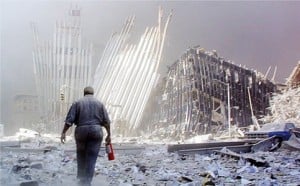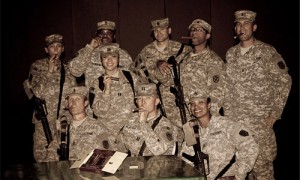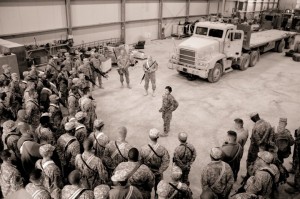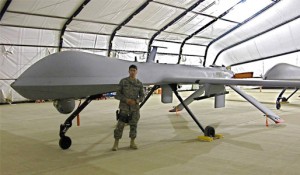There is so much going on in science and technology every day, yet I am compelled instead to write about this singular event of the decade—September 11th. Where were you on 9/11? This is a most often asked question posed to any New Yorker traveling overseas or just going across the State lines. I wish I can say how terrifying that day
was,. How the acrid smoke and the dust filled my lungs. How much anguish it had
been to see the Twin Towers disintegrating right before my very own eyes. I could not say those words. I wasn’t there. I was 6,000 miles away, watching the events of
that fateful day unfold in the safety of a hotel lounge far away from home.
I belong to that minority of New Yorkers who were not home on 9/11. It was about
3 pm in Athens, Greece and I just started giving a lecture at a marine  science symposium at the University of Piraeus. One of the organizers came to the lecture room and whispered to me as I was giving my talk that a plane hit one of the Twin Towers. And I continued on, thinking that it was just an accident. Certainly those massive Towers can withstand any plane. A similar accident also occurred before long ago with a plane hitting the Empire State Building and nothing catastrophic happened. A few minutes later, he came back to tell me that a second plane hit the other Tower. By then almost everyone in the conference room were rushing out by the coffee area, watching the events on CNN. I rushed back to the hotel and became glued to the TV, just like the rest of the billions of human beings on that day.
science symposium at the University of Piraeus. One of the organizers came to the lecture room and whispered to me as I was giving my talk that a plane hit one of the Twin Towers. And I continued on, thinking that it was just an accident. Certainly those massive Towers can withstand any plane. A similar accident also occurred before long ago with a plane hitting the Empire State Building and nothing catastrophic happened. A few minutes later, he came back to tell me that a second plane hit the other Tower. By then almost everyone in the conference room were rushing out by the coffee area, watching the events on CNN. I rushed back to the hotel and became glued to the TV, just like the rest of the billions of human beings on that day.
Though I felt less concerned because my family lived miles away in Queenboro, that concern heightened when it was impossible to reach anyone by phone. Because air travel was restricted indefinitely, I ended up by accident in the Greek island of Ydra, spending a week there, mostly drinking wine and watching the Greek sunset along with a dozen fellow stranded Americans. A week later, I got onboard a plane to
Singapore and from there finally to NYC. Hardly an adventure worth recounting when someone asked where I was on 9/11.
The World Trade Center was memorable to me, not simply as an icon of New York City. I had my wedding luncheon at Windows on the World, a restaurant on top of the Towers. I had New Year’s celebrations there many times over the years. I often go for a drink there and have lunch or dinner meetings with colleagues visiting New York
for the first time. In 2000, I looked at several floors at the Twin Towers for Poseidon Sciences as home office. Only the high expense of the lease and the longer subway ride talked me out of it. The Twin Towers was never pretty, but it exudes power and presence. Not having enough money and being lazy to take a longer subway ride saved me from that disaster just a year later.
Not being home on that unusual day bothered me. For inexplicable reasons, I
never came close to the ruins when I got home; the closest was 10 blocks away to see if my friend, Eugene, was fine. And that was weeks after the event. I can
sense the doom and gloom of downtown Manhattan as soon as I stepped out of the subway station. I can feel the dust settling on my skin. The distinct overpowering smell
that came from the combination of chemicals from plastics, cement, paper… and of
human bodies still burning underneath the rubble, filled my lungs. As a
scientist, curiosity should have drawn me closer, but did not want to. I felt I did not deserve to be there. I did nothing. Perhaps, I felt that pang of guilt for being
so far away then. In fact, I had not gone to see the makeshift memorial after the attacks or even came close to the ruins to this date.
In a study published in JAMA in 2002 entitled “A Nationwide Longitudinal Study of Psychological Responses to September 11″ examined the effects of the World Trade Center attack on the national psyche. In this article, Roxane Cohen Silver, who lead the nationwide study noted:
“This research dispels a number of myths …The effects of a major national trauma are not limited to those directly affected by it, and the degree of response cannot be predicted simply by objective measures of exposure to or loss from the trauma. This fact has not been adequately acknowledged by some mental health professionals….. We believe it is important to recognize that potentially disturbing levels of
trauma-related symptoms can be present in individuals who are not directly
exposed to a trauma, particularly when it is a massive national tragedy such as
the 9-11 attacks….Rather than seeing these symptoms as evidence as psychiatric
disorders, however, their presence is likely to represent a normal response to
an abnormal event.”
New Yorkers, in general, are very resilient mix of peoples. Perhaps, it is the cultural
diversity that makes them less immune to major catastrophes even in their own
backyard. The study in 2004 led by Joseph Boscarino and published in Journal
of General Hospital Psychiatry showed that New Yorker’s use of mental health services only rose slightly after the September 11th terrorist attacks. In fact mental health providers were prepared to provide mental heath services to the thousands of New Yorkers anticipated needing those services, but the expected need never really materialized. Must had been the NY attitude thats hard to fathom at times!
What I think happened instead was the overwhelming need to do something. Some as big as joining the armed forces to fight overseas or as little as helping those in need, big or small. The disaster galvanized people to do something then as therapeutic journey to solidarity. And, on this 10th anniversary, those who had done little, like yours truly, have some soul searching to do. I am not sure if many feel the same way. As a scientist working on marine science issues seemed out of place here, my work irrelevant in many ways.

Jenny enjoying Nat Sherman cigars I sent for her ‘boys.’ Just one of the few pleasures in the desert of Iraq.
This asymmetric warfare, a war between a high tech nation and a low tech enemy, has a common thread repeated thousands of times in thousands of wars over the millennia– that young men (and now women too) go to war and young people die. The basic common thread is always the human element.
Though I had served my time in the army back in the Reagan years, and as I ponder this 10th anniversary of September 11th, I come to realize that I am also fighting this war (and this anger) in a different way–through my own two kids. My daughter, Jennifer, joined the army after college and had already served two tours in
Iraq running convoys through IED infested highways in and out of Baghdad. As an army captain, she is now again getting fresh troops ready for her third tour, this time in Afghanistan. My son, Jason, joined the US Air Force and served his tour in Jalalabad, Afghanistan with a Predator surveillance squadron. We, as a nation, fight wars through our children. This is nothing new in the history of mankind, but something new and personal to me.

- A Christmas card from Jason’s team in the Afghanistan airfield taken at 10,000 ft by another Predator surveilance drone
Today, as the 10thanniversary of that fateful day unfolds, perhaps it is time for me to finally come to terms with my own “post-traumatic shock,” see the Memorial and think about what I can do next for my adopted country.
Jonathan R. Matias, Science Officer
Poseidon Sciences Group
www.poseidonsciences.com
https://scienceblog.com/community/older/2002/C/20025747.html
http://www.scienceblog.com/community/older/2004/2/20041623.shtml


